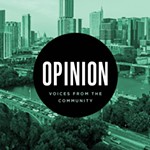Opinion: How to Stop Drug Overdoses in Austin
An overdose prevention center could dramatically reduce overdose rates
By Claire Zagorski, Fri., Aug. 5, 2022
We can stop drug overdoses in Austin.
On June 16, Austin City Council unanimously passed a resolution that drug overdose is a local public health crisis, after the County Medical Examiner's Office issued a report indicating that drug overdose was the leading cause of accidental death, with a 237% increase from 2021. This past March, an important time for Austin tourism, saw a string of more than a dozen drug overdoses, some fatal, all on or near Sixth Street. We are all connected by the shared pain of losing friends, family, and neighbors to overdose.
To understand drug overdoses, let's consider how they happen. Excessively large doses of opioids tell our brains to slow our breathing, and sometimes stop altogether. As such, a mainstay piece of advice for people who use drugs is to never do so alone – have someone there to help. But this advice has its practical limitations. When people use drugs multiple times a day to ward off withdrawal, there often won't be someone available every time. The illegality and shame baked into drug use prompts people to hide when using drugs, hence the common anecdotes of finding people dead in bathrooms and alleyways. Someone needs to be there to help right away and administer naloxone, a safe and effective medicine that reverses overdose, restoring vital breathing and saving lives. Thankfully, we have a template to address this.
Austin needs an overdose prevention center (OPC). OPCs offer a clean and supervised place to use drugs purchased elsewhere, under the watchful eye of expert staff, often nurses and EMTs, ready to spring into action if and when an overdose happens. Instead of someone going without oxygen for several minutes and only being found after their death, naloxone is given immediately and breathing returns in seconds. A life is saved and thousands of dollars in medical costs are avoided. The prior 50 years of the War on Drugs have shown us that even in the face of substantial legal prohibitions, drug use persists. Strategies like OPCs help fill the gaps in this framework.
OPCs save lives while also supporting a healthier community. These facilities are behind closed doors, eliminating the common complaint of people using drugs in public spaces. They require no specialized or costly construction. Supplies used to consume drugs are left behind in special waste containers and disposed of as medical waste, eliminating discarded syringes on sidewalks. As a consistent touch point with people who use drugs, these facilities also function as powerful connectors to health care, substance use disorder treatment, counseling, housing, and more. OPCs are a simple and inexpensive way to connect people who use drugs to the resources needed to find stability, health, and meaningful community connection, while slashing overdose deaths. Research tells us that people who use drugs with access to resources like these have better health outcomes and are also more likely to enter and complete substance use treatment. OPCs exist all over the world, and – critically – there has not been a single overdose death in an OPC. Ever. The OPCs operated by New York City's public health department, known as OnPoint NYC, reversed a staggering 59 overdoses in their first three weeks of operation, and were visited more than 2,000 times.
We call upon the Austin City Council, County Judge Andy Brown, and Mayor Steve Adler to lead an exploration of opening an OPC. Austin has an impressive number of subject matter experts and people with experience of drug use to guide this effort. An OPC would benefit our COVID-strained hospital systems and ease demand on emergency medical services. It would improve the tourism appeal of our beautiful city and benefit Downtown business owners. And most of all, it will save the lives of Austinites – the people who make our vibrant community what it is.
Claire Zagorski is a graduate research assistant in translational science at the University of Texas College of Pharmacy, and adjoint faculty at the Pharmacotherapy Education and Research Center at UT Health Science Center at San Antonio. She is a paramedic and harm reductionist and has worked in these areas since 2013, providing outreach, education, and care to people who use drugs in Central Texas. This piece was co-authored with Lucas Hill, PharmaD; Lindsey Loera, PharmD; Carlos Tirado, MD, MPH; Lorie Kmetz, MSN, FNP-C; and John Weems, MD.
The Chronicle welcomes submissions of opinion pieces on any topic from the community. Find guidelines and tips at austinchronicle.com/opinion.
Got something to say? The Chronicle welcomes opinion pieces on any topic from the community. Submit yours now at austinchronicle.com/opinion.









